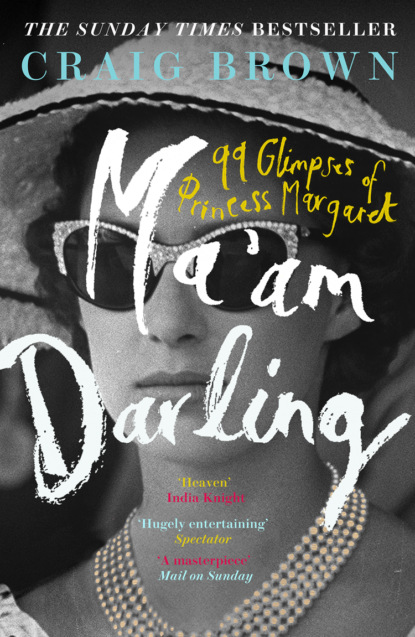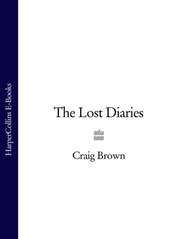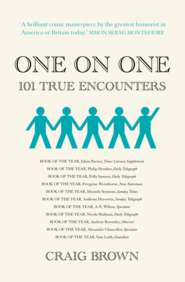По всем вопросам обращайтесь на: info@litportal.ru
(©) 2003-2024.
✖
Ma’am Darling: 99 Glimpses of Princess Margaret
Настройки чтения
Размер шрифта
Высота строк
Поля
‘Nonsense!’ counters Margaret. ‘They’ll pay anything to see us.’
Margaret grabs the title role for herself. ‘Margaret had long since made up her mind she would be Cinderella. Lilibet was principal boy,’ notes Crawfie. During rehearsals, the King complains that he can’t hear a word anyone is saying. He also complains that Elizabeth’s tunic is too short. ‘Lilibet cannot possibly wear that.’
But it is a great success on the night, with the younger sister the star of the show. ‘Margaret brought the house down,’ notes Crawfie.
1 June 1954
Denied by protocol the chance to tread the boards in public, the twenty-three-year-old Princess Margaret accepts the position of assistant director for a production of Edgar Wallace’s thriller The Frog. It is performed for charity for three nights at the Scala Theatre* (#ulink_df4311b7-ca39-52af-b652-4d9be8dc520d) in Charlotte Street, W1, by thirty young amateurs drawn from the upper classes, and stars Maureen, Marchioness of Dufferin and Ava, as a lavatory attendant, the Duke of Devonshire as a prison governor, the Hon. Colin Tennant* (#ulink_b4a4ce74-27ee-53bb-b3cc-146153ead302) in the title role (a serial killer), Billy Wallace as a police sergeant, Henry Porchester as a Cockney detective, and Mrs Gerald Legge as the heroine. Experts in these matters estimate that ten members of the company are titled, and a further ten are the children of peers.
The first-night audience is very nearly as grand, and includes Baroness Alix de Rothschild, Prince Aly Khan, Noël Coward, the Duke and Duchess of Argyll, Professor Isaiah Berlin and Sir Bernard and Lady Docker, whose famous gold-plated Daimler is parked in a side street, guarded by a policeman. At the close of the show Princess Margaret makes a brief speech, telling the audience that they ought to give the cast ‘a jolly good round of applause’.
Backstage, the cast consider the play a whopping success, and reminisce among themselves about the hilarious moments when lines were fluffed and cues forgotten. They remain unaware that some members of the audience are less amused, among them Noël Coward. ‘The whole evening was one of the most fascinating exhibitions of incompetence, conceit and bloody impertinence I have ever seen in my life … the entire cast displayed no talent whatsoever,’ he confides to his diary. ‘It was certainly a strong moral lesson for all of us never to be nervous again on opening nights. Those high-born characters we watched mumbling and stumbling about the stage are the ones who come to our productions and criticise us! They at least displayed no signs of nervousness; they were unequivocally delighted with themselves from the first scene to the last, which, I may add, was a very long time indeed.’
After the show, Coward goes backstage to shower the cast and its assistant director with unheartfelt praise. To his diary, he confides that he found Princess Margaret tucking into foie gras sandwiches and sipping champagne. The Noël Coward Diaries are published in 1982, nine years after his death. Margaret buys a copy, and finally gets to read what he actually thought of her show. Next to his comments, the Princess writes crossly in the margin: ‘I don’t like foie gras.’
22 June 1984
Princess Margaret makes an appearance on Radio 4’s long-running soap opera The Archers. By mutual agreement, she plays herself in her real-life role as president of the National Society for the Prevention of Cruelty to Children. The script dictates that she will be gracing the audience of a charity fashion show at the Grey Gables hotel in Borsetshire, with the equally real-life Duke of Westminster in attendance.
The recording takes place earlier in the month. The Duke of Westminster travels to the BBC Pebble Mill studio in Birmingham to make his recording, but Princess Margaret prefers to be recorded in her small library in Kensington Palace. The Duke’s words and the Princess’s words will be spliced together later.
When the small team from the BBC arrive – among them the actors playing the rustic entrepreneur Jack Woolley and his well-connected associate Caroline Sterling – the Princess expresses concern about the noise of plumbers elsewhere in her apartment, and the ticking of a clock. But the BBC engineer assures her it will be fine.
In their short scene, Jack Woolley is overawed by the presence of the Princess at the Borsetshire fashion show. Playing herself, Princess Margaret sounds curiously flat and uninvolved, almost as though she can’t get to grips with her character; it takes quite a leap of the imagination to believe that she is not simply reading from a script.
DUKE OF WESTMINSTER: Have you met Princess Margaret?
JACK WOOLLEY: Me? Er, no, I don’t believe I …
CAROLINE STERLING: She’s coming this way. Gerald – if you could –
DUKE OF WESTMINSTER: Yes, of course. Ma’am, have you a moment? There’s somebody I’d very much like you to meet.
PRINCESS MARGARET: Good evening.
CAROLINE STERLING: Ma’am.
JACK WOOLLEY: Your Royal Highness.
PRINCESS MARGARET: It seems to be geng terribly well, doesn’t et? What a lahvely place this es. Hev you lived here long?
JACK WOOLLEY: Have I … er … I er?
CAROLINE STERLING: About 1965, wasn’t it Mr Woolley?
JACK WOOLLEY: Was it?
PRINCESS MARGARET: It rilly is a beautiful part of the weld.
JACK WOOLLEY: Oh, oh yes indeed. I was born in Sturtchley you know.
PRINCESS MARGARET: Well, it’s been very good of you to let us tek over your hertel.
CAROLINE STERLING: It’s been our privilege, hasn’t it Mr Woolley?
JACK WOOLLEY: Yes, yes I should say so.
PRINCESS MARGARET: I think you’ve been very generous, but is the Duke was saying, we do need all the help we can get to mek this a viry special year for the NSPCC.
JACK WOOLLEY: Well, if there’s anything else we can do, anything at all, you have only to get in touch.
PRINCESS MARGARET: Careful, we might tek you up on thet.
JACK WOOLLEY: Oh, but you can, you must. In fact I was saying that very thing to er Gerald here a moment ago. Hur! Wasn’t I Gerald? Hur! Hur! Hur!
After their first run-through, the producer, William Smethurst, says, ‘That’s very good, Ma’am, but do you think you could sound as if you were enjoying yourself a little more?’
‘Well, I wouldn’t be, would I?’ replies the Princess.
* (#ulink_73b736a3-56a7-5f23-9b43-fca8d4a86471) The concert sequences in the Beatles’ film A Hard Day’s Night were filmed in the Scala Theatre. After a fire in 1969 it was demolished. An apartment block – Scala House – now stands in its place.
* (#ulink_73b736a3-56a7-5f23-9b43-fca8d4a86471) To defend this book from a marauding army of footnotes, I am not offering dates, jobs, pen-portraits, etc., for every single person mentioned. As I will be going back and forth in time, I also intend to stick to one name per person throughout, regardless of any transformations owing to deaths, marriages or elevations. This means that, for instance, Colin Tennant will remain Colin Tennant throughout, even though, from 1983, he was Lord Glenconner. The same applies to his wife, who was born Lady Anne Coke, then became Lady Anne Tennant, and then Lady Glenconner. From now on she will be Anne Tennant, for no reason other than simplicity. As you may already have noticed, I call the heroine of this book Princess Margaret, HRH the Princess Margaret, Margaret, or the Princess, according to whim.
16 (#ubebacbea-06c5-570e-9c15-1d256ab24093)
The death of their grandfather, the abdication of their uncle, the accession of their father, the start of the Second World War: all these disruptions made it vital to offer the Little Princesses a sense of security, and all the harder for Marion Crawford to move on. But in 1947, at the age of thirty-seven, she finally resolved to marry her long-standing suitor, a fellow Scot called George Buthlay. How to break the news to Their Majesties? While they were away with their daughters on a tour of southern Africa, Crawfie seized the opportunity to broach the subject with old Queen Mary.
‘I made my deep curtsy and kissed the Queen’s hand. She then raised me, and kissed me on both cheeks.
‘“Come now, Crawfie, sit down and tell me all about it,” said Queen Mary in her kind way, meantime spearing for me a muffin on a small silver fork. Her Majesty never touches any food with her fingers.’
She had, she said, come to ask Her Majesty’s advice, as she was planning to get married. Her Majesty’s response was immediate and unequivocal.
‘My dear child. You can’t leave them!’
At this time, the Little Princesses were respectively sixteen and twenty years old.
Crawfie tried to explain that she had, as she put it, ‘shelved the matter during the war years, feeling it was my duty then to stay’. But now the time had come to forge a life of her own.
A life of her own! Queen Mary wouldn’t countenance such a thing. ‘I don’t see how they could manage without you. I don’t think they could spare you now.’ Reading their conversation today, it is striking that at no point does Queen Mary bother to enquire about Crawfie’s fiancé.
On the return of Their Majesties, Crawfie sent a note to Queen Elizabeth asking to see her on ‘a very urgent and important matter of a personal nature’. She was duly summoned to the Queen’s sitting room, taking with her a photograph of her husband-to-be tucked cautiously under her arm. After making ‘my usual deep curtsy’, she presented the photograph to the Queen. ‘This, Ma’am, is the urgent personal matter I have come to see you about.’
The Queen perused the photograph. ‘She was obviously very surprised and somewhat disconcerted. She asked me his name, and I told her that it was George Buthlay and that he came from Aberdeen. She stood for a long time saying nothing whatever. I broke this uncomfortable silence presently and told her how at the start of the war I had wanted very much to marry, and had not done so because I felt I had a duty to Their Majesties, and considered it would be unfair of me to leave the Princesses when they most needed me. But now, I said, the time had come when I wanted a life of my own.’
‘Why, Crawfie, that was a great sacrifice you made,’ said the Queen. All very sensitive, but her sympathy swiftly dispersed, leaving the path clear for a stubborn counter-offensive. ‘Does this mean you are going to leave us? You must see, Crawfie, that it would not be at all convenient just now. A change at this stage for Margaret is not at all desirable.’
Crawfie saw no escape. ‘I assured the Queen the last thing George and I wanted to do was upset Their Majesties’ plans in any way.’







